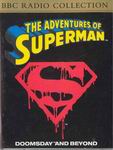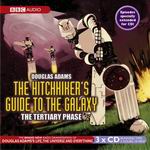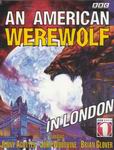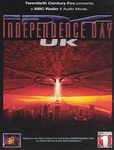
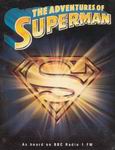 The Adventures of Superman
The Adventures of Superman
Written and Directed by Dirk Maggs; Starring a Full Cast
2 Cassettes – 2.5 Hours [UNABRIDGED]
ISBN: 056339370X
Publisher: BBC
Published: 1994
Themes: / Fantasy / Superhero / Comics /
A review by Jake Black
I’m not really an avid listener of the sci-fi audio, and so it was a bit of a surprise to be invited to write two reviews for SFFAudio. However, the two they asked me to do focus on Superman, and that is a subject with which I am extremely familiar. I have spent the last three plus years working as a contributing writer for the official web sites for Smallville, wrote an issue of the comic series based on that show, and have worked on a ton of assorted academic and comic-related projects centered on the Man of Steel.
This week we’re beginning my reviews with an evaluation of the BBC Radio play The Adventures of Superman. Created in 1994 for radio airplay across the pond, the audio play was presented on two cassettes with a total running time of over two-and-a-half hours. The story is lifted straight from the comic books of 1986-87; a series called Man of Steel written by John Byrne, which relaunched Superman from the beginning. It is Superman from his first appearance in Metropolis. He meets Lois Lane and Lex Luthor for the first time. He discovers the origins of his powers, and creates the dual identity to help others. He fights street thugs, the Kryptonite-infested Metallo, the failed clone Bizarro, all the while trying to bring down the corporate magnate Lex Luthor.
The dialog and story are nearly completely lifted from the comics word for word, albeit with the occasional addition of descriptive dialog to help the listener imagine what everything looks like – clothing etc. While I understand the necessity for such expositional dialog on the tapes, it was a bit cheesy – “How could anyone dress like that, with tan pants and a black t-shirt!” etc.
The voice talent used for the play are all very talented, and create captivating characters with their voices. Nearly all of them match very closely with the voices I’d created for characters like Lois Lane, Jonathan and Martha Kent, and Lex Luthor, while the menacing Metallo and Bizarro are both well cast, too. The only voice I really didn’t like much Clark Kent/Superman played by Stuart Mulligan. While he does his best to drop his voice when he is Superman, it is too high a tenor voice to be taken seriously as either character from the beginning. Lana Lang (voiced by Shelley Thompson) is also a bit of a disappointment as she is a bit too much of a “southern belle” to be from Kansas. But, perhaps, that is due to this being a British piece with actors not knowing the distinctive regional dialects for the USA.
The play is full of nice additions, like sound effects for everything – footsteps, car horns, police sirens, gunshots, etc. However, the sound effect given to Superman’s heat vision is awful. It is similar to the little ray guns that light up and you can buy at the grocery store for a dollar. In spite of this one set back, the mix between dialog, music, and sound effects is perfect. I played it on several different players, and in all cases – including the car – the sound was pure, crisp, and all around nice. It didn’t need an extra boost of volume from any of the players I listened to.
All in all, if you are a Superman, these tapes are a lot of fun. Non-Superman fans may not enjoy them quite as much, but they do provide a good introduction to the character, his background, and his friends and enemies. I’m not totally convinced that they will bring new converts to the ways of the Last Son of Krypton, but they are, overall, entertaining, faithful to the subject matter, and well produced.
This review is copyright 2005 by Jake Black. You can find out more about Jake at his website, http://www.jakeblack.com.

 This just in – The Hitchhiker’s Guide to the Galaxy: Tertiary Phase was named the Audiobook of the Year by the Audio Publisher’s Association at this weekend’s Audie Awards! Congratulations to adapter/director Dirk Maggs and everyone involved with it. It’s fantastic to see a science fiction audio drama win this award. See the SFFaudio review of this title here.
This just in – The Hitchhiker’s Guide to the Galaxy: Tertiary Phase was named the Audiobook of the Year by the Audio Publisher’s Association at this weekend’s Audie Awards! Congratulations to adapter/director Dirk Maggs and everyone involved with it. It’s fantastic to see a science fiction audio drama win this award. See the SFFaudio review of this title here.
